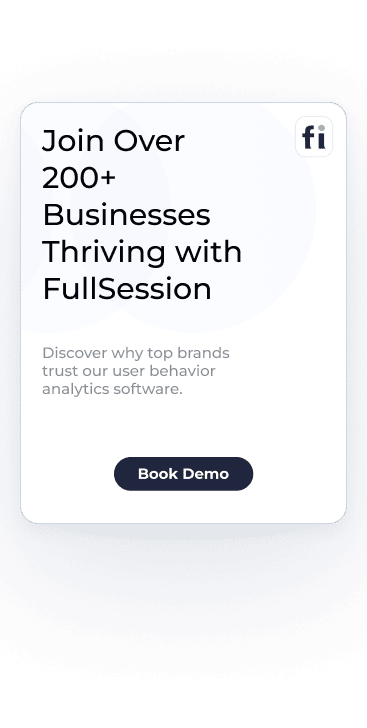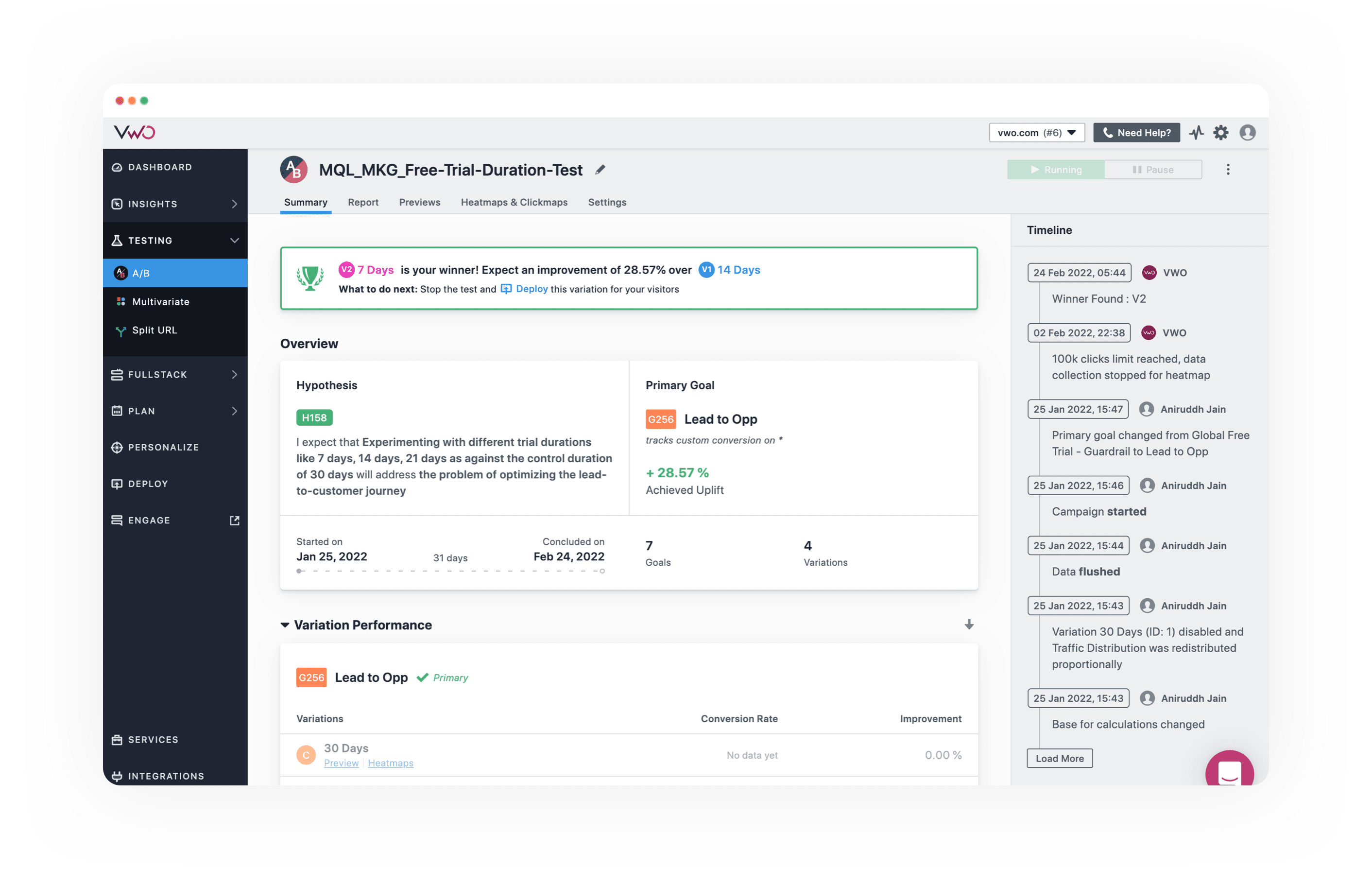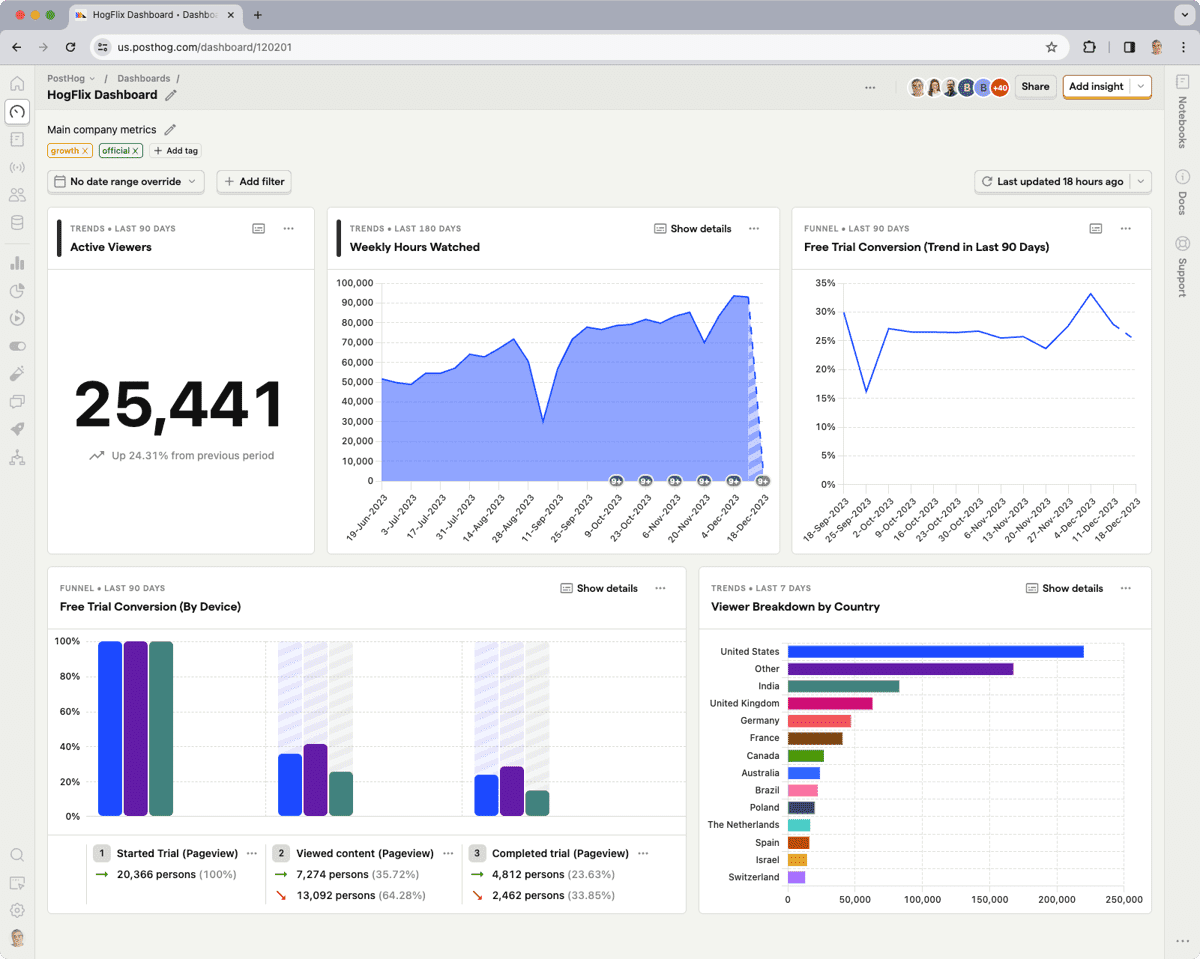Are you looking to optimize your website's performance but unsure if VWO is the right choice? You're in luck! We've compiled...
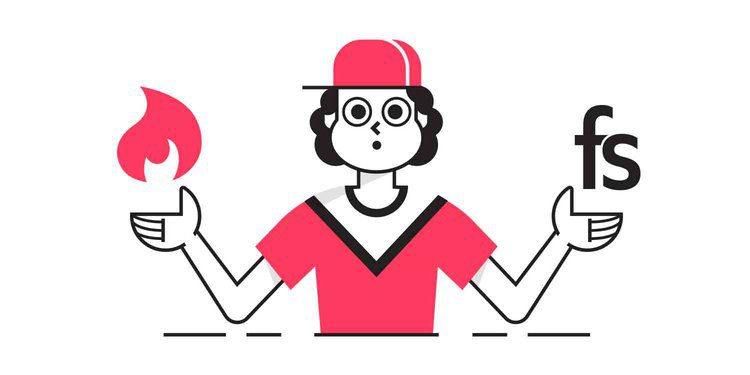
Hotjar vs FullStory: Features, Price, & In-depth Comparison
Hotjar and FullStory are examples of behavior analytics tools that help you monitor user behavior, optimize your website, and increase conversions. While they share similar features, like session recordings and heat maps, key differences also set them apart.
In this article, we’ll discuss these key differences and how they affect your user experience analysis. We’ll also highlight a great alternative – FullSession, our web analytics platform.
It provides you with session recordings and replays, interactive heatmaps, customer feedback forms, funnel and conversion tracking, error analysis, and advanced analytics. These features help you identify friction points and frustration signals, collect customer feedback, and improve product performance.
Start a Free Trial to Experience FullSession
Capture all user interactions, spot trends and patterns and drive improvements without compromising your website performance.
Let’s begin this in-depth comparison article by explaining the basics of Hotjar, FullStory, and FullSession as an alternative to both.
What is Hotjar?
Hotjar is a behavioral and product experience analytics software designed to help product teams and e-commerce brands understand user behavior via session recordings, heatmaps, and customer feedback tools.
Hotjar also helps you eliminate guesswork by asking customers where they encounter issues and have objections to your website. With Hotjar, you can observe what website visitors do on your site and track actions like button clicks, scrolls, and mouse hovering. You can use these insights to improve the overall user experience.
To learn more about this tool, you can read our Hotjar review.
What is FullStory?
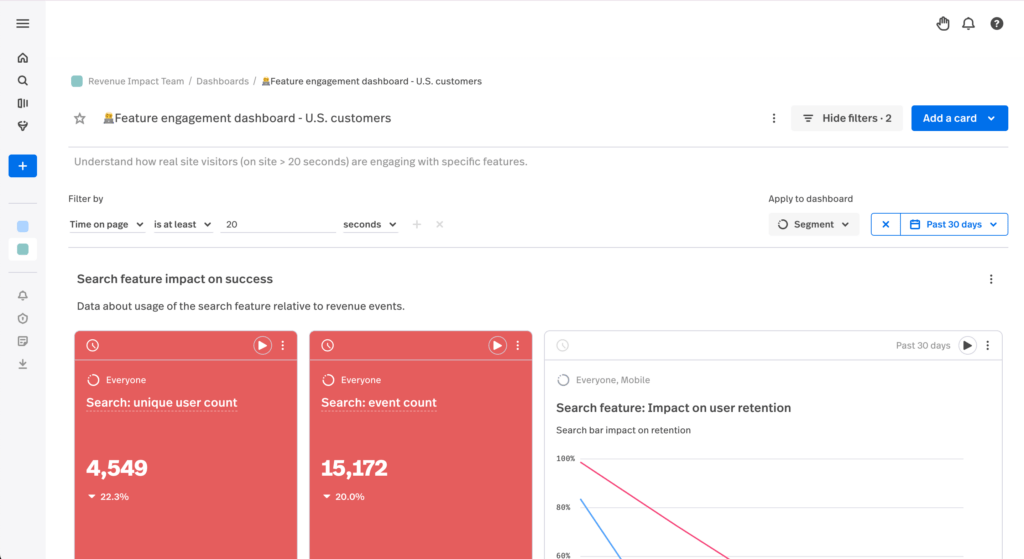
FullStory is website analytics software that helps businesses analyze how users interact with various web and mobile elements, such as drop-down menus, call-to-action buttons, form fields, and more.
FullStory helps you identify website bugs and challenges that various user segments experience when using your website. You can use the data to provide support, improve your site, and optimize the customer experience.
What is FullSession?
FullSession is our customer experience analytics software that helps you collect user feedback and track and analyze user behavior while interacting with your website, web app, or landing page.
It allows you to identify areas where web visitors rage click, experience issues on your site, and fail to convert into paying customers. With this data, you can fix bugs, improve the user experience, and increase conversion rates.
Our user behavioral analytics tool helps product managers, digital marketing teams, web designers, UX researchers, and UX designers visualize user events and track the customer journey.
They have session recordings and replay tools, click, mouse movement, and scroll heat maps, conversion and funnel tracking, error analysis, customer feedback tools, and advanced UX analytics at their disposal.
Get a 360° View of User Behavior
Learn how to visualize and analyze all user interactions with FullSession.
Hotjar vs FullStory: How They Compare and Contrast
At first glance, Hotjar and FullStory are pretty similar. They’re both web analytics tools that help you collect and interpret quantitative and qualitative data on website visitors' user behavior.
While both tools have similarities, they also have key differences that set them apart. In this section, we’ll explore how both solutions compare and contrast.
Hotjar vs FullStory: Basic differences
Here are the primary differences between Hotjar and FullStory:
- Hotjar combines user behavioral data with user feedback to help you understand how website visitors behave across various web pages and what they think about your site. FullStory, on the other hand, lets you analyze user behavior through funnel analysis to identify areas where users drop off the funnel.
- The Hotjar platform gives you an overview of user behavior and the insights you need to improve the user interface. FullStory provides search functionality, and it records each user interaction. You use its search functionality to find user events and support your customers.
- Hotjar doesn’t let you analyze user behavior on mobile apps, while FullStory helps you analyze user behavioral data on mobile apps and websites.
- Hotjar focuses on helping UX teams monitor user behavior and get customer feedback to improve website usability and lead generation. FullStory enables you to identify the user experiences of specific user segments and fix website bugs.
Hotjar vs FullStory: User rating
According to Capterra, Hotjar scores 4.7 out of 5 based on 515 user reviews, while FullStory scores 4.6 out of 5 based on 66 user reviews.
Hotjar vs FullStory: Use cases
Hotjar and FullStory serve similar industries, starting from e-commerce, digital marketing, and product development. They are beneficial for marketing, product development, and customer support teams.
Hotjar vs FullStory: Deployment
You can deploy both Hotjar and Fullstory the same way. You need to copy their Javascript codes into your website source code. The code snippet logs user actions like scrolls, page views, button clicks, mouse movements, and other user interactions.
Hotjar vs FullStory: Features
Here, we’ll compare features feature by feature. First, we’ll examine the features both platforms share and then move on to those that differentiate them.
Heatmaps
Both Hotjar and FullStory provide the heatmap user behavioral tool. With Hotjar, you can use heatmaps to identify friction in the customer experience. You can see where users spend the most time and what impacts their customer journey.
Heatmaps also reveal how users interact with key elements on your web pages, including where users click and scroll.
When using heatmaps, you can visualize user behavioral data via colors. Red indicates the sections of your web pages with the highest engagement, while blue indicates those with the least interaction. A heatmap, in this context, is divided into other facets of on-site user interaction.
1. Scroll maps
Scroll maps show how far users scroll on your website, including the specific percentage for each page section. This way, you can determine whether your pages are too long and why some web page elements don’t get attention.
2. Click maps
Click maps show you where users click on your website. You can use the data to know the buttons, links, and CTAs users click the most.
3. Movement maps
While both tools offer scroll and click maps, they differ in another case.
Hotjar provides another type of heatmap that you won’t find on the FullStory platform: movement maps. This feature shows you user mouse movement patterns so you can see the web elements your users like to interact with the most.
For example, if customers keep navigating around your page’s header, it’s ideal to place CTAs or lead capture links there.
Session recording
While heatmaps are ideal for showing you the web elements that gain the most and least attention, you’ll still want to see how users act when navigating your web pages, and this is where session recordings come into play.
Hotjar and FullStory provide this feature, but FullStory names it “Session Replay.” FullStory offers advanced functionality in its session recordings feature. For instance, you can link customer complaints to a session replay so that customer support can quickly understand the context and solve customer problems.
Heatmaps vs session replays
Unlike heatmaps, the session replay functionality does not provide aggregated statistical data. Instead, The FullStory session replay lets you see exactly how the user navigated your website, how they moved their mouse, and what they clicked.
This important feature lets you gain a bird’s eye view of the user experience. How do all of your customers navigate across various web pages? Do they get stuck hopelessly on the same page? Or do most of them gravitate toward the About Us section instead of your blog?
Analytics data from session recordings answer these questions, and you can use the information to tweak your site’s UI. For instance, if you notice that a particular button shows a dead click, you can quickly fix the issue, optimize your site accordingly, and increase conversion rates.
While Hotjar and FullStory provide session recording features, FullStory is a winner due to the added usability of session recordings for supporting your customers. For instance, when a customer submits a ticket complaining about an issue, FullStory will provide a session replay showing what the user did before and after submitting a ticket.
Feedback widget and survey
You can use the Hotjar “ask” feature to insert surveys on specific web pages to know what users feel and think about your site’s functionality.
FullStory doesn’t provide a native survey feature, but it offers integrations with other platforms, such as Survicate and Qualtrics, to connect your UX data with your targeted surveys.
It also lets you build conversion funnels to map out each step of a user flow. This feature allows you to see where most customers drop off and fail to convert.
Hotjar vs FullStory: Languages
Hotjar's interface is currently available only in English. However, user-facing features like Surveys and Feedback are supported in multiple languages. FullStory only supports English.
Hotjar vs FullStory: Integrations
When connecting with third-party tools, Hotjar and FullStory integrate with popular apps like Optimizely, Hubspot, Slack, Segment, Omniconvert, WordPress, Shopify, and more.
In contrast, FullStory has a much larger base of integrations than Hotjar, which only has seven native integrations. You can connect with more apps via Zapier.
Hotjar vs FullStory: Support
Both tools differ greatly in their support approach. Hotjar provides support via a knowledge base and email, while FullStory provides support via LiveChat and email tickets.
Hotjar vs FullStory: Pricing
Now, let’s move on to how the pricing for each tool can affect your budget. Both products have the same pricing model—they offer a free plan and charge a monthly fee for their premium packages.
Hotjar pricing
Hotjar provides three paid plans—Observe, Ask, and Engage. The Observe plan helps you track customer events using web analytics features like heatmaps and session recording. It includes:
- Basic—costs $0 and allows you to track up to 35 sessions/day
- Plus—costs $39/month and lets you track up to 100 sessions/day
- Business—starts from $99/month and lets you track 500 to 270,000 daily sessions
- Scale—starts at $213/month and lets you track 500 to 270,000 daily session recordings
The Ask plan lets you discover how your users feel and what they have to say via the feedback tool. It is divided into:
- Basic—costs $0 with access to 20 monthly responses
- Plus—costs $48/month with access to 250 monthly responses
- Business—starts from $64/month and lets you receive 500 to 100,000 monthly responses
- Scale—starts at $128/month and offers access to unlimited monthly responses
Lastly, the Engage plan allows you to automate recruitment, scheduling, and hosting for moderated user interviews. It is divided into:
- Basic—costs $0 with access to 3 interviews/month from your own network
- Plus—costs $39.2/month with access to up to 3 interviews/month from the Hotjar participant pool and unlimited interviews from your own network
- Business—starts from $440/month with access to 12 interviews/year from the Hotjar participant pool and unlimited interviews from your own network
- Scale—offers customized pricing and access to 20 interviews/month from the Hotjar participant pool and unlimited interviews from your own network
FullStory pricing
As for FullStory, it offers a free plan that provides basic behavioral analytics. The free plan enables you to track up to 1000 session replays per month.
The FullStory paid plans are divided into three—Business, Advanced, and Enterprise.
- The Business plan offers a 14-day trial and allows you to track up to 5,000 sessions
- The Advanced plan offers premium product analytics tools and everything included in the Business plan
- The Enterprise plan offers a customized plan, so you’d have to contact sales or request a demo
A downside is that the company does not provide transparent pricing, meaning you’ll have to contact their sales team to get a quote.
So far, we’ve covered how Hotjar and FullStory compare and contrast. Let’s move on to an alternative web analytics solution – FullSession, which also helps analyze user behavior.
What is FullSession?
FullSession, our web analytics software, helps you capture and analyze all customer behavioral data and visualize how users interact with your website, web applications, and landing pages. All this goes to one goal: understanding user behavior.
This way, you can identify issues within the user journey, fix them accordingly, and help them convert to paying customers.
Book a demo to see FullSession in action.
What Features Does FullSession Provide?
FullSession provides powerful behavioral analytics tools that show how web visitors and customers interact with your website elements like headers, call-to-action buttons, drop-down menus, and more.
Let’s go deep into each feature.
Session recordings and replays
This web analytics feature lets you see your users’ actions as they navigate your website pages. Session recording and replay go beyond quantitative data and provide specific behavioral data showing:
- User scroll behavior
- Mouse movements
- Button clicks
- Text inputs in real-time without showing sensitive information
With our session recording and replay, you can gain access to data such as:
- User location and IP address
- The URL user visited
- Referrals
- Average time on page
- Total active time on page
- Session list
- Session event
You can skip periods of user inactivity, save time, and focus on what matters. You can also drop notes or share the user session recordings with your team for better collaboration.
Interactive heatmaps
Our website heatmap tool visually represents how individual users interact with your website elements. It highlights areas where users give the most attention and lets you see the most engaging buttons, links, form fields, call-to-actions, blog content, and website copy.
This way, you can use the user insights to optimize your web pages to increase conversions.
With FullSession interactive heatmaps, you can:
- Preview the heatmap on different devices
- See the URL the user visited
- Track clicks and see the number of total views and total clicks
- See the error, rage, and dead clicks
- Get the average load time on page
- Get the average time on page
- See the number of users that visited the page
Click map example
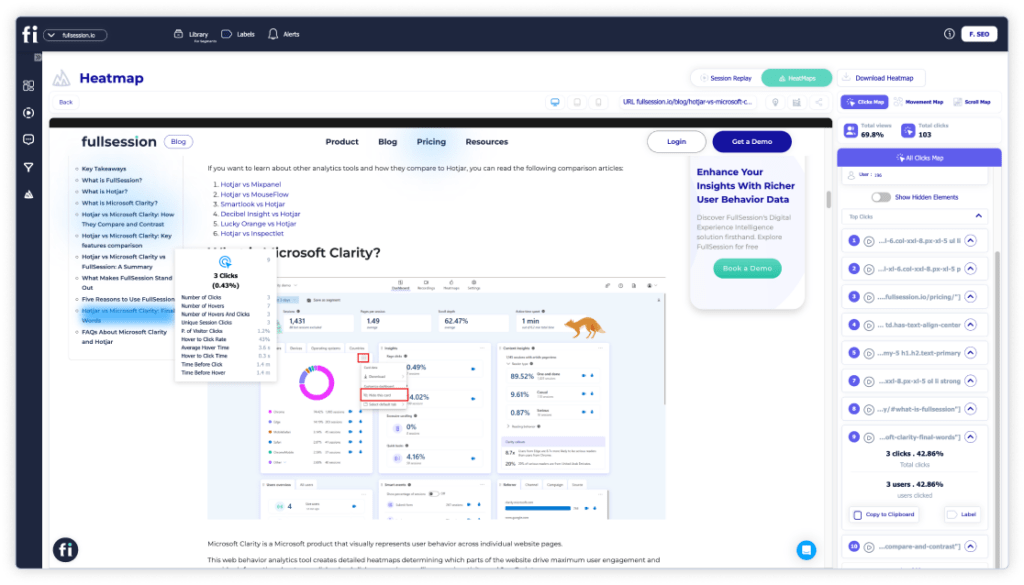
Mouse movement map example
Scroll map example
Insights
FullSession provides detailed insights and an easy-to-understand overview of customer behavior across your web pages to identify frustration signals that lead to funnel drop-offs and decreased conversion rates.
Customer feedback widget
The customer feedback form lets you ask users what they feel and think about their digital experience in real time. You also get access to the customer feedback report, which shows the user ID, URL, comment the user left, device type, and feedback date.
Even better, you can watch a user session related to negative feedback to determine what caused a negative customer experience. This information can help you create a customer-centric strategy for your product.
Segments
Our segments feature helps you build specific user segments and use them to filter major events in user sessions. This saves you time during analysis, as you can quickly find the necessary data.
Notes
The FullSession platform provides notes that enable you to leave comments about customer behavior and share them with your team. This allows you to assess challenging areas and improve your product performance.
Funnel and conversion tracking
This feature lets you track conversion goals using metrics like time to convert and user percentages, giving you powerful insights into your marketing strategy. By pinpointing successful campaigns and areas for improvement, you can maximize your strategy for the best budget value.
The FullSession funnels and conversions feature dives deep into user journeys, allowing you to monitor and optimize every stage of your conversion funnel. With tools like Funnel Steps and Segmentation Analysis, you can:
- Track conversion goals and user percentages to see what’s working
- Gain actionable insights to refine your marketing strategy
- Identify and amplify successful marketing campaigns
- Visualize where users convert or drop off
- Spot trends and seasonal changes in user behavior
- Identify and replicate key actions that boost conversions
- Detect and fix issues causing user drop-offs
- Measure and address user frustration at each step
- Enhance engaging features for better retention and conversions
- Reduce exit points by tracking users leaving early
- Compare and tailor experiences for different user segments
- Analyze performance over time to adjust strategies
Error analysis
The FullSession feature allows you to detect, examine, and correct errors that affect user experience.
By gathering extensive data on various error types, such as error clicks, network failures, console errors, error logs, and unhandled exceptions, FullSession delivers practical insights to boost the reliability and user satisfaction of your digital products.
With this feature, you can:
- Identify and fix elements that cause client-side JavaScript errors
- Monitor and resolve server request failures to ensure smooth connectivity
- Analyze and address JavaScript error messages to improve your application's codebase
- Access detailed error logs to diagnose and fix issues accurately
- Find and handle critical errors to prevent application crashes
- Segment data and visualize trends to understand and address errors
- Receive real-time alerts via Slack for immediate error response
You can book a demo today to learn more.
What Makes FullSession Stand Out
While FullSession provides similar features to Hotjar and FullStory, many traits make it stand out. Here are some of the major ones:
- FullSession helps you quickly filter user sessions to identify significant events via user segments, user feedback, and more.
- While Hotjar will significantly slow your site’s loading speed, FullSession will enable you to analyze user behavioral data without affecting your site’s performance.
- The FullSession insights provide a comprehensive analysis of user behavior and help you quickly identify friction points and funnel drop-offs that affect conversions.
- Our web analytics solution helps you to gather customer feedback and run user surveys to know what users think and feel about their digital experience with your product.
Now that you know some of the traits that make FullSession unique, let’s move on to why FullSession is ideal for your web analytics needs.
Four Reasons to Use FullSession
Here are four key reasons why you should use FullSession for your web analytics needs.
- FullSession enables you to spot user pain points and bugs via its session replay feature.
- Our web analytics tool categorizes analytics data so you can thoroughly analyze performance issues across your web pages.
- FullSession provides advanced filtering options that help you better understand user events and spot Javascript errors during a session recording.
- The FullSession platform is easy to set up and use. You don’t need any advanced technical knowledge to get the insights you need.
Before we conclude this in-depth piece, let’s briefly highlight the key features of each tool we mentioned in this article.
Hotjar vs FullStory vs FullSession: A Summary
This table highlights a summary of the main points so that you can grasp the features of each tool.
| Features | Hotjar | FullStory | FullSession |
| Real-time session recording | ✔ | ✔ | ✔ |
| Funnel analysis | ✘ | ✔ | ✔ |
| Customer segmentation | ✔ | ✔ | ✔ |
| Customer journey mapping | ✔ | ✔ | ✔ |
| Conversion tracking | ✔ | ✔ | ✔ |
| Interactive heatmaps | ✘ | ✘ | ✔ |
| Customer feedback | ✔ | ✘ | ✔ |
| Insights | ✘ | ✘ | ✔ |
| Free version | ✔ | ✔ | ✘ |
| Free trial | ✔ | ✔ | ✔ |
| Monthly pricing | $39 | N/A | $39 |
Hotjar vs FullStory: Final Words
Both Hotjar and FullStory are known for helping people analyze user behavior data. However, each tool has its strengths and weaknesses.
While FullStory offers more ways to support customers, it cannot collect customer feedback to uncover objections and struggles.
On the other hand, Hotjar is a good option for collecting direct feedback that you can use to improve your site’s UI. Ultimately, you’ll need to choose the right affordable tool that can meet your business’s needs.
However, don’t get stuck deciding between the two – you can consider other great alternatives.
The Best User Behavior Analytics Tool
FullSession is an excellent alternative that provides real-time session recordings and dynamic heatmaps that help you visualize your users’ actions on your site.
Even better, FullSession allows you to gather data and make the correct CX analysis without slowing down your site, unlike Hotjar, which slows down a site’s loading speed. You can also use our customer feedback forms to ask customers about their experience using your website.
We’ve written about other analytics tools and how they compare to Hotjar. Feel free to check some of our unbiased reviews, such as Hotjar vs Crazy Egg, Lucky Orange vs Hotjar, and Hotjar vs Mixpanel vs ClickTale.
FullSession Pricing Plans
The FullSession platform offers a 14-day free trial and three paid plans: Starter, Business, and Enterprise. A yearly subscription can save you up to 20%!
Here are more details on each plan.
- The Starter plan costs $39/month or $32/year and allows you to monitor up to 5,000 monthly sessions with up to 6 months of data storage.
- The Business plan costs $75/month or $60/year and helps you to track and analyze up to 100,000 monthly sessions with up to 12 months of data storage.
- The Enterprise plan has custom pricing and offers customizable sessions plus full access to all features.
Track User Behavior the Easy Way With FullSession
Setting up your web analytics dashboard with FullSession takes less than 5 minutes, and it's completely free!
Get a demo now.
FAQs About Hotjar vs Fullstory
What is the difference between Hotjar and FullStory?
Hotjar focuses on heatmaps, user feedback, and session recordings, providing insights into what users are doing on your site. FullStory offers a more detailed, qualitative analysis with advanced session replay, error tracking, and in-depth user interaction insights.
What is the disadvantage of Hotjar?
One disadvantage of Hotjar is that its free and lower-tier plans have a data storage limit, which can restrict long-term analysis. Additionally, it may not offer as detailed session replays as some competitors like FullStory.
Why is Hotjar better than Google Analytics?
Hotjar is better for visualizing user behavior through heatmaps and session recordings, which Google Analytics doesn't offer. It also provides direct user feedback tools like surveys and polls, giving a more qualitative understanding of user experience.
What is Hotjar good for?
Hotjar is excellent for understanding how users interact with your website. It visualizes user behavior with heatmaps, captures detailed session recordings, gathers user feedback through surveys and polls, and identifies areas for improvement to enhance user experience.
